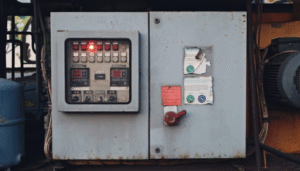There’s something oddly comforting about the hum of an oven warming up — the promise of fresh bread, a bubbling casserole, or cookies that make the whole house smell like happiness. But sometimes, instead of the scent of home-cooked goodness, you’re hit with an unpleasant, sharp odor that makes you wrinkle your nose. If your oven smells bad when turned on, don’t panic. It’s a pretty common issue, and in most cases, it’s fixable without needing a repair bill that hurts more than the smell itself.
That “New Oven” Smell That Won’t Quit
If you’ve just bought a new oven, that weird chemical scent during the first few uses is actually normal. Manufacturers often coat the oven interior with protective oils that burn off when heated for the first time. Some people describe it as a plastic-like or metallic odor. It’s annoying but harmless. Running the oven empty at a high temperature for 30 to 60 minutes (with the windows open!) usually burns it off.
But if your oven’s been with you for a while and that smell keeps showing up every time you cook — well, that’s a different story. Food residue, spills, or even cleaning products can be the culprits here.
The Lingering Funk of Forgotten Food
Burnt food bits are sneaky. A small cheese spill from last week’s pizza or that roasted chicken grease that dripped onto the bottom tray — they can cling, burn, and create a smoky or acrid odor every time you preheat. That’s why it’s important to give your oven a little love every now and then.
Try removing the racks and cleaning them separately with baking soda paste or a bit of dish soap and warm water. For the oven interior, skip harsh chemical cleaners if you can. A natural mix of baking soda and vinegar works wonders. Let it sit overnight, then wipe clean. Your nose will thank you later.
Sometimes people ask, “Why does my oven smell even after I clean it?” The answer could be hiding in less obvious spots — like underneath the bottom heating element or behind the fan cover in convection models. Those areas tend to trap grease and crumbs over time, slowly burning with each use.
The Mysterious Metallic or Gas-Like Odor
Now, here’s where things get serious. If you smell gas or a metallic odor before the oven even starts heating, stop immediately. Turn off the oven, open the windows, and avoid lighting anything nearby. It could indicate a gas leak or malfunctioning burner. Don’t second-guess it — call your gas provider or a professional technician right away.
For electric ovens, a metallic smell can sometimes come from wiring issues or the heating element wearing out. It’s rare, but it happens, especially in older models. Either way, never ignore anything that smells like burning metal or electrical plastic.
When Cleaning Products Make It Worse
Ironically, sometimes the source of the problem is our attempt to fix it. Strong oven cleaners or degreasers often leave behind chemical residues. When the oven heats up, those chemicals burn and release fumes that smell worse than the mess you were trying to clean.
If this happens, wipe down the oven again with a damp cloth and mild soap. You can even “bake out” the chemical odor by running the oven empty at 400°F for 20–30 minutes with the door slightly open (if your model allows it). It’s not glamorous, but it usually works.
Hidden Causes You Might Not Expect
Every once in a while, the culprit isn’t food or chemicals at all. Maybe a bit of packaging or plastic wrap accidentally got left inside. Or, in rare cases, a small piece of rubber insulation or a plastic utensil might have fallen onto a heating element. Those smells are particularly nasty — like burnt rubber mixed with melted plastic. If you suspect that, let the oven cool completely and inspect it carefully before using it again.
Another possibility? Moisture buildup. If you live in a humid area or don’t use your oven often, a musty smell can form. Running the oven at a low temperature for an hour can help dry things out.
The Everyday Burn-Off Method
Sometimes, the simplest approach works best. If your oven smells bad, just give it a “burn-off session.” Set it to around 500°F for 20 minutes. Leave the kitchen, open a few windows, and let it do its thing. The high heat will vaporize leftover residues that cause odors. Once it cools down, wipe away any ash or soot.
If you have a self-cleaning oven, use that feature sparingly. It’s convenient but harsh on the components and can even create temporary smells of its own. Think of it as a deep-clean option you use once in a while — not every time there’s a spill.
A Few Prevention Tips That Actually Work
- Use oven liners or trays to catch drips and spills — but make sure they’re heat-safe.
- Wipe spills immediately after cooking (once the oven cools).
- Ventilate your kitchen while baking or roasting. A little airflow keeps lingering odors from setting in.
- Avoid overusing sprays or degreasers. They can mask smells temporarily but leave residues that burn later.
Wrapping It Up — A Fresh Start
Your oven’s supposed to fill your kitchen with warmth and delicious scents, not make you question your life choices every time you bake a lasagna. Thankfully, most odor issues come down to simple cleaning, awareness, and occasional maintenance.
If the smell persists despite all your efforts, it might be time to call in a pro. They can check hidden components like the insulation or wiring that you can’t safely reach. But for most people, a bit of scrubbing and a “burn-off” usually restores that clean, cozy vibe we all love.
Because really, a home-cooked meal shouldn’t come with mystery fumes. Keep things clean, stay alert, and let your oven do what it was made for — turning raw ingredients into comfort on a plate.


